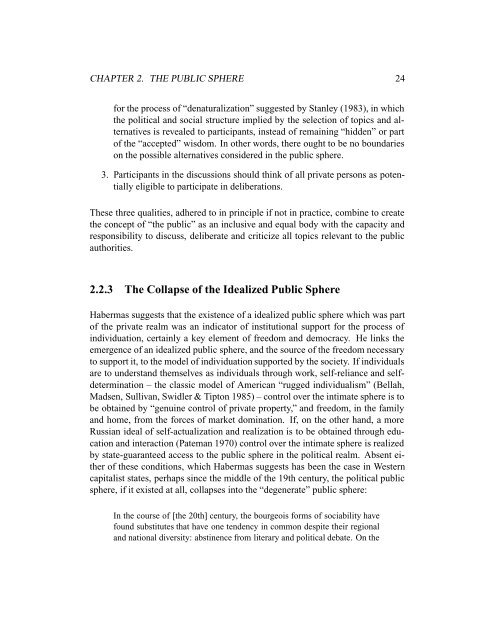Expanding the Public Sphere through Computer ... - ResearchGate
Expanding the Public Sphere through Computer ... - ResearchGate
Expanding the Public Sphere through Computer ... - ResearchGate
You also want an ePaper? Increase the reach of your titles
YUMPU automatically turns print PDFs into web optimized ePapers that Google loves.
CHAPTER 2. THE PUBLIC SPHERE 24<br />
for <strong>the</strong> process of “denaturalization” suggested by Stanley (1983), in which<br />
<strong>the</strong> political and social structure implied by <strong>the</strong> selection of topics and alternatives<br />
is revealed to participants, instead of remaining “hidden” or part<br />
of <strong>the</strong> “accepted” wisdom. In o<strong>the</strong>r words, <strong>the</strong>re ought to be no boundaries<br />
on <strong>the</strong> possible alternatives considered in <strong>the</strong> public sphere.<br />
3. Participants in <strong>the</strong> discussions should think of all private persons as potentially<br />
eligible to participate in deliberations.<br />
These three qualities, adhered to in principle if not in practice, combine to create<br />
<strong>the</strong> concept of “<strong>the</strong> public” as an inclusive and equal body with <strong>the</strong> capacity and<br />
responsibility to discuss, deliberate and criticize all topics relevant to <strong>the</strong> public<br />
authorities.<br />
2.2.3 The Collapse of <strong>the</strong> Idealized <strong>Public</strong> <strong>Sphere</strong><br />
Habermas suggests that <strong>the</strong> existence of a idealized public sphere which was part<br />
of <strong>the</strong> private realm was an indicator of institutional support for <strong>the</strong> process of<br />
individuation, certainly a key element of freedom and democracy. He links <strong>the</strong><br />
emergence of an idealized public sphere, and <strong>the</strong> source of <strong>the</strong> freedom necessary<br />
to support it, to <strong>the</strong> model of individuation supported by <strong>the</strong> society. If individuals<br />
are to understand <strong>the</strong>mselves as individuals <strong>through</strong> work, self-reliance and selfdetermination<br />
– <strong>the</strong> classic model of American “rugged individualism” (Bellah,<br />
Madsen, Sullivan, Swidler & Tipton 1985) – control over <strong>the</strong> intimate sphere is to<br />
be obtained by “genuine control of private property,” and freedom, in <strong>the</strong> family<br />
and home, from <strong>the</strong> forces of market domination. If, on <strong>the</strong> o<strong>the</strong>r hand, a more<br />
Russian ideal of self-actualization and realization is to be obtained <strong>through</strong> education<br />
and interaction (Pateman 1970) control over <strong>the</strong> intimate sphere is realized<br />
by state-guaranteed access to <strong>the</strong> public sphere in <strong>the</strong> political realm. Absent ei<strong>the</strong>r<br />
of <strong>the</strong>se conditions, which Habermas suggests has been <strong>the</strong> case in Western<br />
capitalist states, perhaps since <strong>the</strong> middle of <strong>the</strong> 19th century, <strong>the</strong> political public<br />
sphere, if it existed at all, collapses into <strong>the</strong> “degenerate” public sphere:<br />
In <strong>the</strong> course of [<strong>the</strong> 20th] century, <strong>the</strong> bourgeois forms of sociability have<br />
found substitutes that have one tendency in common despite <strong>the</strong>ir regional<br />
and national diversity: abstinence from literary and political debate. On <strong>the</strong>
















